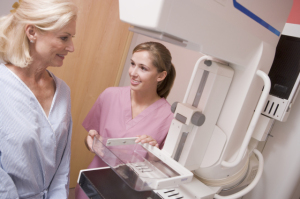by
Lauren Dubinsky, Senior Reporter | April 21, 2015
The U.S Preventive Services Task Force (USPSTF) released the draft update for its breast cancer screening recommendations on Monday — but not much has changed from the 2009 recommendations. The recommendations state that women between ages 50 and 74 should only undergo routine biennial screening and women in their 40s should discuss with their physician whether they need screening.
On the their website, the Task Force gives screening women ages 40 to 49 a "C" recommendation and wrote, “Women who place a higher value on the potential benefit than the potential harms may choose to begin screening between the ages of 40 and 49 years.” The Task Force gave screening women ages 50 to 74 a "B" recommendation.
The American College of Radiology (ACR) believes that adoption of these recommendations “would result in thousands of additional and unnecessary breast cancer deaths each year,” and may also strip women in their 40s of private insurance coverage for mammograms at the time of their choice. The Affordable Care Act only requires private insurers to cover procedures with a "B" recommendation or higher.



Ad Statistics
Times Displayed: 79947
Times Visited: 2851 Ampronix, a Top Master Distributor for Sony Medical, provides Sales, Service & Exchanges for Sony Surgical Displays, Printers, & More. Rely on Us for Expert Support Tailored to Your Needs. Email info@ampronix.com or Call 949-273-8000 for Premier Pricing.
"Insurance coverage has allowed more women to undergo screening and benefit from the reduced mortality rate," Dr. Susan Harvey, director of the Johns Hopkins Breast Imaging Section, told DOTmed News. "If we continue to decrease access and increase cost this will reverse progress that has been made over decades of improved technology and care. Creating financial barriers targets under-resourced women and impinges on the right to choose preventive care in this population."
On its website, the Task Force stated that the draft recommendations will not affect insurance coverage. It stated that the ACA links the final recommendations to many requirements and benefits for public and private insurers to encourage prevention but that this link is not factored into the development of its science-based recommendations.
The ACR stated that published analysis that used the Task Force’s 2009 recommendations found that if women from ages 40 to 49 go unscreened and women between ages 50 to 74 are screened biennially, then about 6,500 additional women in the U.S. would die as a result of breast cancer every year.
A study published in JAMA Internal Medicine in 2014 did find that patients experience short-term anxiety over test results but that the anxiety quickly subsides over time and that a false-positive result causes no measurable impact on the patient’s health.
“The USPSTF limited its consideration to studies that underestimate the lifesaving benefit of regular screening and greatly inflate overdiagnosis claims. They ignored more modern studies that have shown much greater benefit,” Dr. Barbara Monsees, chair of the ACR Breast Imaging Commission, said in a statement.
The ACR and the Society of Breast Imaging support the USPSTF Transparency and Accountability Act of 2015, which was recently introduced in the House of Representatives. The bill’s goal is to gain more transparency from the Task Force over the public comment process, adherence to the Administrative Procedures Act, engaging stakeholder experts and patients in a meaningful way and public access to deliberations and support materials.

